Masatsugu Asakawa
Masatsugu Asakawa is the President of the Asian Development Bank (ADB) and the Chairperson of ADB’s Board of Directors. He was elected President by ADB’s Board of Governors and assumed office on 17 January 2020.
How We're Organized
ADB is committed to achieving a prosperous, inclusive, resilient, and sustainable Asia and the Pacific, while sustaining its efforts to eradicate extreme poverty. Established in 1966, it is owned by 68 members—49 from the region.
Masatsugu Asakawa is the President of the Asian Development Bank (ADB) and the Chairperson of ADB’s Board of Directors. He was elected President by ADB’s Board of Governors and assumed office on 17 January 2020.
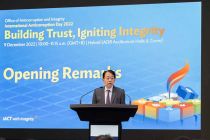 President Asakawa calls for upholding integrity to embody ADB values at the International Anticorruption Day
President Asakawa calls for upholding integrity to embody ADB values at the International Anticorruption Day
Speaking at the International Anticorruption Day celebration on 9 December 2022 President Masatsugu Asakawa reminded ADB personnel that in upholding the highest ethical standards, we are trustworthy, transformational, and client-centric. Two of the US State Department’s 2021 Anticorruption Champions – ProTenge.KZ Founder Jamilya Maricheva and Anti-Corruption Organization of Thailand Executive Committee Member Torplus Yomnak – and former Undersecretary General for UN Internal Oversight Services Heidi Mendoza shared their experiences and insights at a session on Building Trust, Igniting Integrity: Sustaining relationships in rebuilding Asia and the Pacific.
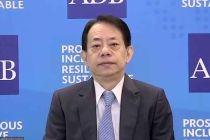 President Asakawa highlights ADB’s continuing support at ASEAN-Japan Business Meeting
President Asakawa highlights ADB’s continuing support at ASEAN-Japan Business Meeting
President Masatsugu Askawa on 8 December 2022 participated virtually at opening of the 48th ASEAN-Japan Business Meeting. President Asakawa noted that in the past 50 years, ADB has supported ASEAN in many areas, — including infrastructure, social development, and climate change. From 2000 to November 2022, the ADB extended about $74.6 billion in loans and grants to Southeast Asian economies with bilateral and multilateral donors contributing about $24 billion during the same period. This assistance has supported the region’s economic transformation and critical policy reforms, improving living standards and opening opportunities to all members of society, — particularly the poor and vulnerable, and women and girls. Kengo Sakurada, Keizai Doyukai Chair; Parliamentary Vice Minister Takagi Kei of the Japan Ministry of Foreign Affairs; State Minister Nakatani Shinichi of the Japan Ministry of Economy, Trade and Industry; Cambodia Ambassador to Japan Tuy Ry; and Yuji Hirako, 48th ASEAN-Japan Business Meeting Chairperson, attended the ceremony.
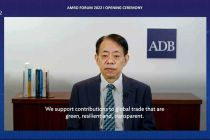 President Asakawa speaks at AMRO ASEAN+3 Forum
President Asakawa speaks at AMRO ASEAN+3 Forum
President Masatsugu Asakawa on 2 December 2022 opened the ASEAN+3 Economic Cooperation and Financial Stability Forum in Singapore. Under the theme Forging Resilience and Sustainability amid Uncertainty, the President emphasized the importance of globalization and reiterated ADB’s commitment towards a resilient and inclusive globalization through financial assistance and policy dialogue. Regional Cooperation and Integration Division Director Cyn-Young Park participated in the panel session on Securing Macroeconomic and Financial Sustainability – Challenges and Opportunities, stressing the need for policy makers to remain vigilant against financial turmoil and strengthen regional financial safety nets. Forum panelists from international organizations and ASEAN+3 central banks shared their views on how the region can avoid the looming risks and challenges through the collective efforts of national authorities.
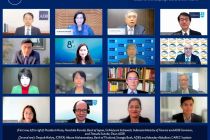 President Asakawa, senior officials, and experts celebrate ADBI's 25th anniversary
President Asakawa, senior officials, and experts celebrate ADBI's 25th anniversary
Bank of Japan Governor Haruhiko Kuroda, Indonesia Finance Minister and ADB Governor Sri Mulyani Indrawati, President Masatsugu Asakawa, and other senior officials and experts celebrated ADBI’s 25th anniversary online on 1 December 2022. Opened by ADBI Dean Tetsushi Sonobe, the event examined the institute’s policy support for developing Asia and the Pacific since its founding as ADB’s Tokyo-based think tank in 1997 and possible next steps. It recognized the winners of the ADBI 25th anniversary essay contest winners, who shared new ideas on forward-looking economic development policies. The celebration spotlighted ADBI's new book Strategies for Developing Asia's Future: 25 Years of the Asian Development Bank Institute. Watch the webinar recording.
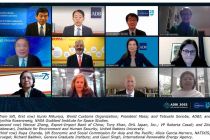 2022 ADBI Annual Conference spotlights supply chain resilience solutions for uncertain conditions
2022 ADBI Annual Conference spotlights supply chain resilience solutions for uncertain conditions
Senior officials and experts discussed strategies for building supply chain resilience to mitigate global threats to food and energy security and promote recovery among Asia’s trade-reliant developing economies during the virtual 2022 ADBI Annual Conference on 28-30 November. President Masatsugu Asakawa emphasized the importance of greater regional cooperation and digital trade to boost sustainable development amid rising uncertainty. World Customs Organization Secretary General Kunio Mikuriya explained how regulatory and human capital development can enhance post-trade services interoperability and small business trade in the digital era while World Food Prize laureate Cynthia Rosenzweig urged consolidated climate resilience measures to support sustainable food systems. Other experts described research-based approaches for boosting trade and transportation after the COVID-19 pandemic, addressing financial and climate risks, and easing supply chain disruptions. Read the news release.

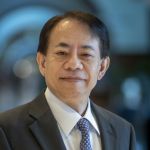










Masatsugu Asakawa is the President of the Asian Development Bank (ADB) and the Chairperson of ADB’s Board of Directors. He was elected President by ADB’s Board of Governors and assumed office on 17 January 2020. In August 2021, he was reelected for a 5-year term starting on 24 November 2021.
Under Mr. Asakawa’s leadership, ADB made significant contributions to the region’s COVID-19 pandemic response and recovery planning with a $20 billion comprehensive response package and $9 billion Asia Pacific Vaccine Access Facility. He also played a key role in rolling out a series of new and innovative financing initiatives—including an Energy Transition Mechanism — to spur the region’s low-carbon development and elevated ADB’s 2030 cumulative climate financing ambition to $100 billion as ADB continues to focus on the battle against climate change.
Prior to joining ADB, he served as Special Advisor to Japan’s Prime Minister and Minister of Finance, and has a close-to-four decades’ career at the Ministry of Finance with diverse professional experience that cuts across both domestic and international fronts.
In the immediate aftermath of the Global Financial Crisis, Mr. Asakawa, in his capacity as Executive Assistant to Prime Minister Taro Aso, took part in the first G20 Leaders’ Summit Meeting in November 2008. He was instrumental in orchestrating a globally coordinated financial package to abate the financial crisis, including a $100 billion loan from Japan to the International Monetary Fund (IMF). Then in 2016, in his capacity as Vice Minister of Finance for International Affairs, he took on a leading role for the G7 Finance Ministers and Central Bank Governors’ meeting in Sendai under the Japanese presidency, where a sustainable and inclusive development agenda was extensively discussed.
Most recently, he served as Finance Deputy for the G20 meetings under the Japanese presidency, playing a pivotal role for the success of the G20 Osaka Summit as well as the G20 Finance Ministers and Central Bank Governors’ meeting in Fukuoka. Some of his outstanding achievements in Osaka include the endorsement by the G20 Leaders of the “G20 Principles for Quality Infrastructure Investment” and the “G20 Shared Understanding on the Importance of UHC Financing in Developing Countries”. Before these, he had occupied various prominent positions within the Finance Ministry, including director positions in charge of development policy issues, foreign exchange markets, and international tax policy.
Mr. Asakawa’s professional experience extends beyond the realms of the Japanese government. Most notably, he served as Chief Advisor to ADB President Kimimasa Tarumizu between 1989 and 1992, during which time he spearheaded the creation of a new office focused on strategic planning. Also, he had frequent engagement with the Organisation for Economic Co-operation and Development in such positions as Chair for Committee on Fiscal Affairs (2011–2016). Furthermore, he was a senior staff at the Fiscal Affairs Department of the IMF (1996–2000). In the meantime, he gave lectures as Visiting Professor at the Graduate School of Economic Science, Saitama University (2006–2009), and at the Graduate School of Arts and Sciences, University of Tokyo (2012–2015).
Mr. Asakawa obtained his BA from University of Tokyo (Economics Faculty) in 1981, and MPA from Princeton University, USA, in 1985.